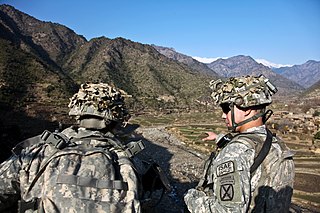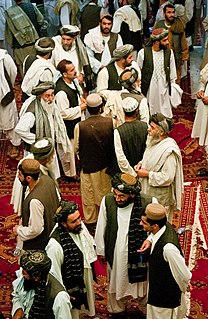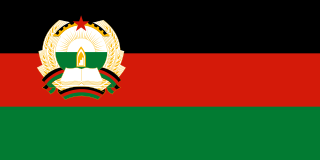This article needs additional citations for verification .(September 2009) |
| |||||||
| Founded | 2003 | ||||||
|---|---|---|---|---|---|---|---|
| Ceased operations | 2004 | ||||||
| Headquarters | Afghanistan | ||||||
MarcoPolo Airways was an airline based in Afghanistan.
This article needs additional citations for verification .(September 2009) |
| |||||||
| Founded | 2003 | ||||||
|---|---|---|---|---|---|---|---|
| Ceased operations | 2004 | ||||||
| Headquarters | Afghanistan | ||||||
MarcoPolo Airways was an airline based in Afghanistan.

Afghanistan, officially the Islamic Emirate of Afghanistan, is a landlocked country located at the crossroads of Central and South Asia. Referred to as the 'Heart of Asia', it is bordered by Pakistan to the east and south, Iran to the west, Turkmenistan to the northwest, Uzbekistan to the north, Tajikistan to the northeast, and China to the northeast and east. Occupying 652,864 square kilometers (252,072 sq mi) of land, the country is predominately mountainous with plains in the north and the southwest, which are separated by the Hindu Kush mountain range. As of 2021, its population is 40.2 million, composed mostly of ethnic Pashtuns, Tajiks, Hazaras, and Uzbeks. Kabul is the country's largest city and serves as its capital.

Kabul is the capital and largest city of Afghanistan, located in the eastern section of the country. It is also a municipality, forming part of the greater Kabul Province, and it is divided into 22 districts. According to estimates in 2021, the population of Kabul was 4.6 million and it serves as Afghanistan's political, cultural and economical center. Rapid urbanization has made Kabul the world's 75th largest city.

Operation Enduring Freedom (OEF) was the official name used by the U.S. government for the Global War on Terrorism. On 7 October 2001, in response to the September 11 attacks, President George W. Bush announced that airstrikes targeting Al-Qaeda and the Taliban had begun in Afghanistan. Operation Enduring Freedom primarily refers to the War in Afghanistan, but it was also affiliated with counterterrorism operations in other countries, such as OEF-Philippines and OEF-Trans Sahara.

The Taliban, which also refers to itself by the name of its state, the Islamic Emirate of Afghanistan, is a Deobandi-Pashtun Islamic fundamentalist, militant Islamist, and jihadist political movement in Afghanistan. It ruled approximately three-quarters of the country from 1996–2001, before being overthrown following the United States invasion. It regained power in August 2021 after years of insurgency.

Pashtuns, also called Pakhtuns or Pathans and historically known as Afghans, are an Iranian ethnic group who are native to Central and South Asia. Pashtuns are the 26th-largest ethnic group in the world, and the largest segmentary lineage society. There are an estimated 350–400 Pashtun tribes and clans, with a variety of origin theories.
Dari, or Dari Persian, is a political term used for the various dialects of the Persian language spoken in Afghanistan. Dari is the term officially recognised and promoted since 1964 by the Afghan government for the Persian language, hence it is known as Afghan Persian or Eastern Persian in many Western sources. As Professor Nile Green remarks "the impulses behind renaming of Afghan Persian as Dari were more nationalistic than linguistic" in order to create an Afghan state narrative. Persian in Afghanistan is generally called Fārsi (فارسی) by Persian-speakers and Pārsi (پارسی) by ethnic Pashtuns. Apart from a few basics of vocabulary, there is little difference between formal written Persian of Afghanistan and Iran. The term "Dari" is officially used for the characteristic spoken Persian of Afghanistan, but is best restricted to formal spoken registers. Persian-speakers in Afghanistan contend that the term "Dari" has been forced on them by the dominant Pashtun ethnic group as an attempt to distance Afghanistan from its cultural, linguistic, and historical ties to the rest of the Persian-speaking world, which includes Iran, Tajikistan and parts of Uzbekistan.

The Democratic Republic of Afghanistan (DRA), renamed to the Republic of Afghanistan in 1987, covers the national history of Afghanistan from 1978 to 1992, during the one-party rule of the People's Democratic Party of Afghanistan (PDPA).

The Soviet–Afghan War (1979–1989) was a conflict wherein insurgent groups known collectively as the Mujahideen, as well as smaller Marxist–Leninist–Maoist groups, fought a nine-year guerrilla war against the Democratic Republic of Afghanistan (DRA) and the Soviet Army throughout the 1980s, mostly in the Afghan countryside. The Mujahideen were variously backed primarily by the United States, Pakistan, Iran, Saudi Arabia, China, and the United Kingdom; the conflict was a Cold War-era proxy war. Between 562,000 and 2,000,000 Afghans were killed and millions more fled the country as refugees, mostly to Pakistan and Iran. Between 6.5%–11.5% of Afghanistan's population is estimated to have perished in the conflict. The war caused grave destruction in Afghanistan, and it has also been cited by scholars as a contributing factor to the dissolution of the Soviet Union and the end of the Cold War, in hindsight leaving a mixed legacy to people in both territories.

Hamid Karzai is an Afghan politician who served as President of Afghanistan from 22 December 2001 to 29 September 2014. He is also the khan (head) of the Popalzai Durrani Pashtun tribe of Kandahar Province.

Pashto, sometimes spelled Pukhto or Pakhto, is an Eastern Iranian language of the Indo-European family. It is known in Persian literature as Afghani.

The International Security Assistance Force (ISAF) was a multinational military mission in Afghanistan from 2001 to 2014. It was established by United Nations Security Council Resolution 1386 pursuant to the Bonn Agreement, which outlined the establishment of a permanent Afghan government following the U.S. invasion in October 2001. ISAF's primary goal was to train the Afghan National Security Forces (ANSF) and assist Afghanistan in rebuilding key government institutions; however, it gradually took part in the broader war in Afghanistan against the Taliban insurgency.

The Durand Line forms the Afghanistan–Pakistan border, a 2,670-kilometre (1,660 mi) international land border between the countries of Afghanistan and Pakistan in South Asia. The western end runs to the border with Iran and the eastern end to the border with China.

The national flag of the Islamic Emirate of Afghanistan consists of a white field with a black Shahada,it was adopted on 15 August 2021 after the end of the war. Since the Anglo-Afghan War of 1919, also known as the War of Independence, Afghanistan has used about 19 national flags, more than any other country in this period. The national flag had black, red and green colors most of the time during the period.

Mohammad Ashraf Ghani Ahmadzai is an Afghan politician, academic, and economist who served as the second and last president of the Islamic Republic of Afghanistan between September 2014 and August 2021.

The War in Afghanistan was a conflict that took place from 2001 to 2021 in the South-Central Asian country of Afghanistan. It began when the United States and its allies invaded Afghanistan and toppled the Taliban-ruled Islamic Emirate. The war ended with the Taliban regaining power after a 19 years and 10 months-long insurgency against allied NATO and Afghan Armed Forces. It was the longest war in United States history, surpassing the Vietnam War (1955–1975) by approximately five months.

The Afghanistan conflict is a continuous series of wars fought in Afghanistan from 1978 through to the present day.

The COVID-19 pandemic in Afghanistan is part of the worldwide pandemic of coronavirus disease 2019 caused by severe acute respiratory syndrome coronavirus 2. The virus was confirmed to have spread to Afghanistan when its index case, in Herat, was confirmed on 24 February 2020.

The 2021 Taliban offensive, also known as the summer offensive, was a military offensive by the Taliban insurgent group and other allied militants against the Islamic Republic of Afghanistan that led to the fall of the republic based in Kabul and marked the end of the nearly 20-year-old War in Afghanistan, that had begun following the United States invasion of the country.

Afghanistan's capital city of Kabul was captured by the Taliban on 15 August 2021, the culmination of a military offensive that began in May 2021, which led to the overthrowing of the Islamic Republic of Afghanistan under President Ashraf Ghani and reinstation of the Islamic Emirate of Afghanistan under the Taliban. The city's capture prompted an international airlift of fleeing civilians and took place hours after President Ashraf Ghani fled the country to Uzbekistan.

The Islamic Republic of Afghanistan was a presidential republic in South-Central Asia that ruled most of Afghanistan from 2004 to 2021. The state was established to replace a transitional authority formed following the 2001 United States invasion of Afghanistan, which captured most of the country from the Taliban-led Islamic Emirate of Afghanistan. Following the War in Afghanistan, it lost control of the majority of the country to the Islamic Emirate in the summer offensive of 2021, culminating in its removal by the Taliban subsequently in the Taliban's capture of Kabul on 15 August 2021.